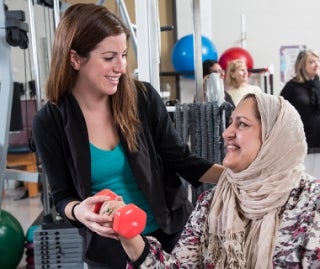
It’s an experience all too common among cancer survivors— when chemotherapy or radiation ends, so does the outpouring of support.
“People think that when treatment ends life just goes back to normal,” says Erin Rellinger-Smith, a certified exercise physiologist with UW Fitness, “but that’s not always the case.”
It’s certainly not the case for women diagnosed with hormone receptor-positive breast cancer.
After completing radiation or chemotherapy, women with this specific type of breast cancer typically face an additional five to ten years of anti-estrogen therapy. These years are often riddled with unpleasant side effects like weight gain, joint pain, insomnia, depression and fatigue.
“It’s not talked about as publically as radiation or chemotherapy,” says Rellinger-Smith. “They are expected to go to go back to work, pick up where they left off. There isn’t the same support.”
Enter UW LIVING- FIT, a new on-campus program aimed at closing the gap in support and opening up a dialogue about hormone therapy.
UW LIVING-FIT
Launched in January 2013 by UW FITNESS with the generous support of the Zonta Foundation, UW LIVING-FIT provides women undergoing hormone therapy with a place to talk about their treatment, discuss ways to manage side effects and develop strategies for living well. The behavioural support sessions encourage physical activity and ways to incorporate activity into daily life.
“We place a big emphasis on the benefits of walking,” says Rellinger-Smith, who leads the six-week program. “It’s something that is accessible and easy to maintain, even while experiencing side effects.”
At the start of the program, participants are given a pedometer and encouraged to track their steps and set their own goals.
“I was always under the impression that walking was cheating when it came to fitness,” says Evelyn Bertoncello, a breast cancer survivor and participant of the program. “I was very encouraged by the promotion of walking as an acceptable fitness activity.”
Now in its second cohort, UW LIVING-FIT continues to support program alumni with regular check-in sessions.
“One of the real benefits of the program is the chance to connect and stay connected with other breast cancer survivors to share stories and support,” says Bertoncello.
“This is a way to get support and advice and encouragement. It’s a way to keep moving forward...one foot at a time.”